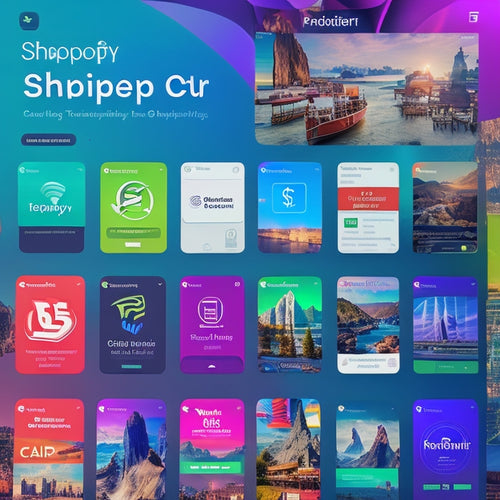Best Shopify Apps to Increase Sales and Conversion
Share
This article examines the effectiveness of various Shopify apps in increasing sales and conversion rates. The objective is to provide an impartial assessment of the benefits these apps offer, along with tips and tutorials for optimizing their usage.
By exploring different app integrations within the Shopify platform, readers can gain a comprehensive understanding of how these tools can enhance their online business performance.
This knowledge-driven approach aims to persuade and empower readers seeking ways to maximize their e-commerce potential.
- Utilize Shopify apps to improve user experience
- Increase customer satisfaction through personalized recommendations
- Make it easier for customers to navigate the website and find products
- Encourage repeat visits and foster brand loyalty
Benefits of Shopify Apps
This discussion aims to explore the various benefits of using Shopify apps to enhance sales and conversion rates on e-commerce platforms.
By utilizing these apps, businesses can effectively boost their sales and conversion rates through targeted marketing strategies and improved customer experience.
Additionally, these apps streamline inventory management processes, ensuring accurate stock levels and timely order fulfillment.
Moreover, implementing Shopify apps can significantly enhance website performance, resulting in a seamless user experience that encourages repeat visits and increased customer satisfaction.
Boosts Sales and Conversion
To enhance sales and conversion rates, implementing effective strategies is crucial. One such strategy is utilizing Shopify apps to improve user experience and increase customer satisfaction.
These apps offer a range of features designed to optimize the online shopping experience for customers, ultimately leading to higher sales and conversion rates. By improving user experience, these apps make it easier for customers to navigate through the website, find products they are interested in, and complete their purchases with ease.
Additionally, these apps often provide personalized recommendations based on customers' browsing history and preferences, further enhancing customer satisfaction. The ability to customize the shopping experience according to individual preferences not only increases customer satisfaction but also boosts sales by encouraging repeat visits and fostering brand loyalty.
Improves Customer Experience
Implementing effective strategies to enhance the online shopping experience can lead to improved customer satisfaction and ultimately contribute to higher sales and conversion rates.
One crucial aspect of improving customer experience is creating a user-friendly interface. A user-friendly interface refers to a website design that is easy to navigate, visually appealing, and intuitive for customers. It should provide clear product information, simple checkout processes, and convenient search options.
By offering a user-friendly interface, customers can easily find what they are looking for, leading to increased satisfaction with their shopping experience. Additionally, a user-friendly interface can reduce frustration and increase customer trust in the platform, resulting in repeat purchases and positive word-of-mouth referrals.
Overall, prioritizing customer satisfaction through a user-friendly interface is essential for optimizing sales and conversion rates in online retail businesses.
Enhances Marketing Strategies
Enhancing marketing strategies in online retail businesses can be achieved through the implementation of user-friendly interfaces that improve customer experience and satisfaction.
One effective way to enhance marketing strategies is through targeted advertising. By using data analytics and customer segmentation techniques, online retailers can identify their target audience and tailor their advertisements accordingly. Targeted advertising allows businesses to reach potential customers who are most likely to be interested in their products or services, resulting in higher conversion rates and increased sales.
Another effective strategy for enhancing marketing is social media promotions. With the increasing popularity of social media platforms, businesses have the opportunity to connect with a large audience and promote their products or services through engaging content, influencer partnerships, and targeted ad campaigns. Social media promotions enable businesses to build brand awareness, drive traffic to their websites, and generate leads, ultimately contributing to the success of their marketing strategies in online retail.
Streamlines Inventory Management
Streamlining inventory management in online retail businesses involves implementing efficient systems and processes that help optimize stock levels, improve order fulfillment, and minimize costs.
Effective inventory optimization is crucial for ensuring that the right products are available at the right time to meet customer demand while minimizing excess stock. By utilizing advanced algorithms and data analytics, businesses can accurately forecast demand patterns and adjust their stock levels accordingly. This not only helps prevent out-of-stock situations but also reduces storage costs associated with excessive inventory.
Additionally, implementing robust stock management practices enables businesses to track product movement throughout the supply chain, ensuring accurate inventory counts and reducing the risk of errors or discrepancies.
Ultimately, streamlining inventory management allows online retailers to operate more efficiently, enhance customer satisfaction through improved order fulfillment rates, and achieve cost savings by eliminating unnecessary overheads related to excess stock.
Increases Website Performance
Improving website performance is a crucial aspect for online businesses as it directly impacts user experience and ultimately affects customer satisfaction and conversion rates.
Website optimization plays a vital role in enhancing the overall functionality and efficiency of a website, leading to improved page load speed. A slow-loading website can frustrate users, resulting in higher bounce rates and lowered engagement levels.
On the other hand, a fast-loading website provides users with a seamless browsing experience, enabling them to access information quickly and efficiently. Studies have shown that even slight improvements in page load speed can significantly increase conversion rates and revenue for online businesses.
Therefore, investing in strategies to optimize website performance, such as image optimization, minifying code, caching techniques, and server optimizations, is essential for maximizing user satisfaction and driving business success.
Tips to Increase Sales
Effective pricing strategies, a streamlined checkout process, engaging product descriptions, and upselling and cross-selling techniques are all crucial elements in increasing sales for online businesses.
Implementing well-researched and data-driven pricing strategies can help attract customers and maximize profits.
A streamlined checkout process ensures a seamless buying experience for customers, reducing cart abandonment rates.
Engaging product descriptions that highlight the unique features and benefits of the products can persuade potential buyers to make a purchase.
Lastly, implementing upselling and cross-selling techniques can encourage customers to add more items to their cart or upgrade their purchases, ultimately driving up sales revenue.
Effective Pricing Strategies
To optimize sales and conversion rates on Shopify, it is crucial to implement well-designed pricing strategies.
By utilizing customer segmentation and conducting competitive analysis, online retailers can tailor their pricing strategies to better meet the needs and preferences of their target audience, ultimately leading to increased sales and conversions.
Customer segmentation involves dividing customers into distinct groups based on characteristics such as demographics, purchasing behavior, or psychographics. This allows retailers to understand the unique needs and preferences of different customer segments and adjust their pricing accordingly.
Additionally, conducting competitive analysis helps retailers identify how their competitors are pricing similar products or services, enabling them to position themselves competitively in the market.
Streamlined Checkout Process
Having addressed effective pricing strategies in the previous subtopic, we now turn our attention to the importance of a streamlined checkout process for improving conversion rates and optimizing the overall shopping experience.
A well-designed and efficient checkout process is essential in reducing cart abandonment and increasing customer satisfaction. By simplifying the steps required to complete a purchase, minimizing distractions, and offering multiple payment options, online retailers can significantly enhance their conversion rates.
Furthermore, incorporating features such as guest checkouts, auto-fill forms, progress indicators, and mobile optimization can further streamline the checkout experience. Implementing these strategies not only reduces friction during the purchasing journey but also instills trust and confidence in customers.
As we explore various Shopify apps to increase sales and conversion rates, it becomes evident that optimizing the checkout process is crucial for achieving e-commerce success.
Engaging Product Descriptions
Engaging product descriptions play a crucial role in attracting and capturing the attention of potential customers. A well-crafted description has the power to entice customers and persuade them to make a purchase. Creative branding and visual storytelling are effective techniques that can be used to enhance product descriptions. By incorporating these strategies, businesses can create a unique brand identity and establish an emotional connection with their target audience.
Creative branding involves using innovative approaches to differentiate products from competitors in the market. This can include using catchy slogans, memorable taglines, or unique packaging designs. Visual storytelling, on the other hand, utilizes compelling images or videos to convey the features and benefits of a product in an engaging manner.
When crafting product descriptions, it is essential to provide detailed information about the product's features and specifications while also highlighting its unique selling points. Utilizing persuasive language and appealing visuals helps captivate potential customers' attention, leading to increased sales and conversions.
Upselling and Cross-Selling
Upselling and cross-selling are common techniques used by businesses to increase revenue and maximize the value of each customer transaction.
Upselling refers to the practice of persuading customers to upgrade their purchase or buy a more expensive version of a product, while cross-selling involves recommending additional products that complement the customer's original purchase. Both strategies aim to increase the average order value and enhance customer satisfaction.
To implement successful upselling techniques, businesses can offer add-ons or upgrades that provide increased functionality or improved features. This can be achieved through personalized recommendations based on the customer's browsing history or previous purchases. Additionally, businesses can highlight the benefits and advantages of upgrading during the sales process, emphasizing how it enhances the overall user experience.
Cross-selling strategies involve suggesting related products that complement the customer's initial purchase. These suggestions can be based on popular pairings or frequently bought together items. By presenting customers with options that enhance their original purchase, businesses not only increase their sales but also provide a more comprehensive solution for their customers' needs.
Helpful Tutorials for Shopify Apps
One valuable resource for users looking to maximize the benefits of Shopify apps are the various tutorials available that provide step-by-step instructions and guidance on their implementation and functionality. These helpful tutorials serve as a comprehensive knowledge base, enabling users to gain a deeper understanding of how to effectively utilize Shopify apps for their business needs.
The availability of these tutorials is an important factor in empowering users towards liberation from potential constraints or limitations they may encounter while using Shopify apps. By providing clear instructions and detailed explanations, these tutorials enable users to make informed decisions about which apps to choose and how best to implement them.
Furthermore, these tutorials also offer recommendations for specific Shopify apps that have been proven effective in increasing sales and conversion rates. By highlighting the features and benefits of each recommended app, users can easily identify which ones align with their business goals and objectives.
Overall, the existence of helpful tutorials enhances the user experience by equipping them with the necessary knowledge and skills needed to fully leverage the functionalities offered by Shopify apps. As a result, users can confidently optimize their online store's potential for increased sales and improved conversions.
Learn More About Shopify App Integrations
A comprehensive understanding of the available integrations for Shopify apps can be obtained by exploring various educational resources and tutorials. These resources offer valuable insights into how different apps can be integrated with the Shopify platform to enhance sales and conversions. By learning about these integrations, entrepreneurs can make informed decisions about which apps to incorporate into their online stores.
To gain knowledge about Shopify app integrations, individuals can refer to a variety of sources such as official documentation, third-party websites, and forums dedicated to discussing eCommerce solutions. These resources often provide detailed instructions on how to install and configure specific apps for optimal performance.
Furthermore, examining real-life examples of successful Shopify app integrations can provide inspiration and guidance. Many developers showcase their work through case studies or demo videos that highlight the features and benefits of their apps. Additionally, reading customer reviews and testimonials about different Shopify apps can give potential users an idea of how well these integrations perform in real-world scenarios.
Frequently Asked Questions
How Do I Install Shopify Apps on My Store?
Shopify apps can enhance store customization and optimization. To install a Shopify app, follow these steps: 1) Go to the Shopify App Store. 2) Browse and select an app. 3) Click "Add app" and grant necessary permissions.
Can I Use Multiple Shopify Apps Simultaneously?
The use of multiple Shopify apps simultaneously has both advantages and disadvantages. It allows for increased functionality and customization, but can also lead to potential conflicts and complications. Effective management and organization are essential for optimizing the use of multiple apps.
Are There Any Free Shopify Apps Available?
When considering Shopify app pricing, it is important to note that there are indeed popular free Shopify apps available. These apps offer a range of features and functionalities without any additional cost to the user.
How Do I Know Which Shopify App Is the Best Fit for My Store?
Can I Customize the Appearance and Functionality of a Shopify App to Match My Brand?
Customizing the appearance and functionality of a Shopify app is possible to match a brand. This allows for the integration of specific design elements and desired features, enhancing the overall user experience and brand identity.
Related Posts
-

Factors for Profitability: Evaluating Shopify App Potential
This article examines the factors involved in evaluating the potential profitability of developing a Shopify app. By...
-

Does Shopify Have SEO Optimization
This article examines the extent to which Shopify offers SEO optimization capabilities. The objective of this analys...
-

Unlocking Revenue Potential: Join the Shopify App Store Revenue Share Plan
The Shopify App Store has implemented a new revenue share plan for its partners, aimed at unlocking their revenue po...


